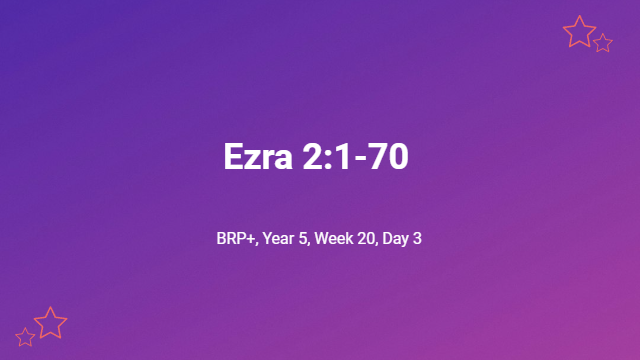Ezra 2:1-70
Q.1. From where did the pioneers who returned come? Where did they go? What do we know about the returning leaders? – (Ezra 2:1-2 c.f. 1 Chr.3:16-19; Hag.1:1; Zech.3:1; Mt.1:12-13; Lk.3:27)
Though most of the returnees from Babylon were originally from Judah, some had settled there from the tribes of Israel, under Hezekiah and Josiah (2 Chr.30:1, 11; 35:17). They returned to their towns in Jerusalem and Judah, under the leadership of the High Priest, Joshua, and the governor, Zerubbabel, who was of royal descent.
Q.2. What kinds of people did Ezra include in his record? Why were some not recognized at that time? What restrictions were placed upon some of the priests? – (Ezra 2:2-62)
Ezra included the heads of the families from the various towns of Judah, plus those of the priestly and Levitical order, and the singers and temple servants (some descended from the families appointed by Solomon). Some were prevented from serving, because – These searched among their ancestral registration, but they could not be located; therefore they were considered unclean and excluded from the priesthood (Ezra 2:62). Everything was done decently and in order.
Q.3. How could those who had lost their birth records be restored to serve? What further offerings were made for the restoration of the temple? Where did the people settle? – (Ezra 2:63-70)
Today, when records are lost or destroyed, there is no retrieval. Not so in Israel – The governor said to them that they should not eat from the most holy things until a priest stood up with Urim and Thummim (Ezra 2:63). Perhaps one day this will again be possible, to determine the tribal origin of the 144,000 spoken of in Revelation 7:4-8; 14:1-5. Beyond the collection back in Babylon, the heads of the families contributed to the rebuilding project, according to their abilities (Ezra 2:68-69). After arrival, each group settled back in their own towns (Ezra 2:70).

